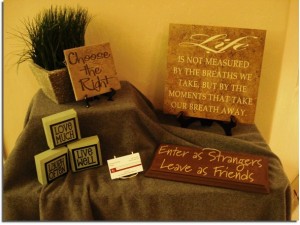Engagement Survey Results
Firmographics

(more…)
Several corporations use a 12 question survey to measure how engaged their employees are in the company and use this as a measure to determine the quality of the workplace. I thought it would be interesting to apply these questions to the church.
You may take the survey here, or link to it here
I will share the results when/if I get 250 responses.
About three years ago I was listening to a Sunstone Symposium recording (a “Pillars of my Faith” talk) given by John Kesler where he talked about his conversion to the gospel after being an atheist for quite a while. He also mentioned that later in his life as a member of the church he started meditating with a Zen Buddhist which led him to feel incredible love and connection with God, which has also allowed him to occasionally hear God’s voice. He also described the experience as training one’s thoughts and gaining self mastery. As a result, I was intrigued with the concept of meditation as a spiritual practice and decided to look into it some more.
I found out that meditation is a part (or has been a part) of the spiritual practice of Buddhists, Christians, Muslims, Hindus, etc. for thousands of years. I started paying attention to the use of the word meditation in the correlated materials and the word is often used in conjunction with prayer, scripture study, and fasting as a means to feeling God’s presence and experiencing personal revelation. However, the context that I believe most Mormons use the word is often synonymous with the concept of pondering, or thinking deeply about something; rather than as a systematic mental exercise. The spiritual practice of meditation in other traditions seems to be somewhat different than what I think Mormons do (though it may still be parallel in some regards).
(more…)
There have been rumors circulating in recent months that the threefold mission of the church that became part of Mormonism under President Kimball (Proclaim the Gospel, Perfect the Saints, Redeem the Dead) was going to be expanded to include something about caring for the poor and needy. It now appears those rumors were accurate. We get this from Peggy Fletcher Stack’s article on the subject today:
The LDS Church is adding “to care for the poor and needy” to its longstanding “threefold mission,” which is to preach the LDS gospel, purify members’ lives and provide saving ordinances such as baptism to those who have died.
This mission first was coined by late LDS President Spencer W. Kimball in the 1980s and since then has been repeated as a mantra by the church’s more than 13 million members.
The new group of phrases will be described as The Church of Jesus Christ of Latter-day Saints’ “purposes,” rather than missions, and will be spelled out in the next edition of the LDS Church Handbook of Instructions , due out next year, church spokesman Scott Trotter confirmed this week.
I like it. A lot.
Utah was atop yet another list of happiest states in the USA.
I’ll bet that really chaps the hides of critics and enemies of Mormonism. For some reason that makes me happy (and I don’t even live in Utah).
I can’t get my head around it. Why do Mormons name their kids crazy gibberish words? Or if they go with a normal name, they have to spell it in some insane way that makes no sense? What is up with that? There’s at least one in every ward I’ve ever been in. Is it Cree-L’s fault?
No wonder missionaries all go by Elder and Sister. No one would listen to a guy named Bucket.
Despite my propensity for nonconformity and insubordination, I did my best to assimilate when I went on a mission. I followed a lot of rules, even most of the ones that seemed unnecessary. However, sometimes my contumacious nature could not be contained. (more…)
Recently, we’ve been watching old film strips for FHE. The kids love turning the film in the projector, and the ward library has oodles of these. I really recommend it. This one is probably the most ridiculous we’ve come across, so enjoy.
ps- I don’t really know any of the history around these film strips, so if anyone has a resource, I’d love to know.
 If you live outside the Mormon corridor, you may not have seen these types of signs or tiles up in people’s homes (as illustrated in the photo to the left). It seems like every Mormon home I go to has a sign up in awesome stenciled lettering which provides opportunities for reflection on deep gospel principles (like “Choose the Right” or “Love is Spoken Here”). I haven’t loved the new fad of the decorative tiles or the vinyl stenciling on the walls until I saw one that stated, “What if the Hokey Pokey really is what it’s all about?” At that moment I realized that we could start something wonderful that will catch on, especially in Utah Valley. I thought of some new ones that would work well in our home and hope you will share some sayings that you think could catch on. My wife thinks about 1/3 are totally dumb, but who knows which one will soon be hanging in our home? You may hold the key to swaying her with your vote.
If you live outside the Mormon corridor, you may not have seen these types of signs or tiles up in people’s homes (as illustrated in the photo to the left). It seems like every Mormon home I go to has a sign up in awesome stenciled lettering which provides opportunities for reflection on deep gospel principles (like “Choose the Right” or “Love is Spoken Here”). I haven’t loved the new fad of the decorative tiles or the vinyl stenciling on the walls until I saw one that stated, “What if the Hokey Pokey really is what it’s all about?” At that moment I realized that we could start something wonderful that will catch on, especially in Utah Valley. I thought of some new ones that would work well in our home and hope you will share some sayings that you think could catch on. My wife thinks about 1/3 are totally dumb, but who knows which one will soon be hanging in our home? You may hold the key to swaying her with your vote.
Honoring your agency means telling you no.
I never said it would be easy.
Obedience is the first law of heaven. The second is like unto the first.
It is always darkest before God opens a window.
I love you no matter how I treat you.
(more…)
For those unaware, The Juvenile Instructor broke the news this morning that the church will be taking a break from Teaching of the Presidents of the Church for at least 2010-2011 to return to basics with the publication of a new edition of the Gospel Principles manual. Finding this out, I acquired a copy, and perused the first 10 chapters. Here are my impressions.
One thing I have never really understood in my short little life as a Latter-day Saint (trying to be!) is the intersection between patriotism and mormonism within the church. Does it just go back to the Utah’s long hard road to statehood? Did it come before or after the nigh-canonization of the U.S. Constitution, or is that an out-growth of the hyper-patriotism? Is it because the Gospel was restored in the US, and so the US law was the only set up where the government could prosper, or is that just after-the-fact justification for our love of country? I suspect it does relate to the Book of Mormon’s praise of this land as a “Land of Promise”, but wasn’t that Mexico/Peru/Patagonia/Panama/Wherever? (Are their other limited geography spots?) Maybe it’s because we believe in being subject to Kings/Rulers/Magistrates, and honoring and sustaining the law, but I don’t see this translating over to other nations as much.
Anyway, what do you think? Why are we so danged Patriotic?
(Happy 4th of July, don’t blow your fingers off)